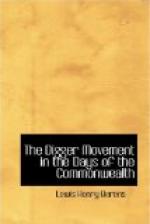[16:1] Church History, vol. iv. p. 407.
[17:1] When occasion arose, they do not seem to have been averse to giving publicity to their opinions. In 1656 a London publisher, Giles Calvert, to whom we shall have occasion to refer again, republished A Discourse on the Family of Love, originally presented to the High Court of Parliament in the time of Queen Elizabeth. This Giles Calvert was the printer and publisher of nearly all Winstanley’s pamphlets, and also one of the first authorised printers and publishers for the Children of Light, as the Quakers, or Society of Friends, originally styled themselves. We have reason to believe that Calvert, as well as many other of Winstanley’s disciples, joined the Quakers about the time of the republication of this pamphlet.
[18:1] “There is no other flame in which the sinner is plagued, and no other punishment of hell, than the perpetual anguish of mind which accompanies habitual sin.”—Erasmus, Enchiridion. Quoted by Beard.
[18:2] See Communism in Central Europe in the Time of the Reformation, by Karl Kautsky, more especially p. 79.
[19:1] Green’s Short History of the English People, p. 457.
[21:1] History of Civilisation in England, vol. i. p. 340.
[21:2] Ibid. vol. i. p. 351.
CHAPTER III
THE GREAT CIVIL WAR
“The lawful power of making laws to command whole politic societies of men, belongeth so properly to the same entire societies, that for any prince or potentate of what kind soever upon earth, to exercise the same of himself, and not either by express commission immediately and personally received from God, or else by authority derived at the first from their consent, upon whose persons they impose laws, it is no better than mere tyranny. Laws they are not therefore which public approbation hath not made so.”—HOOKER, Ecclesiastical Polity.
When Chillingworth’s great work was published, in 1637, the last of the Tudors, after having outlived her popularity, had passed to her rest, as had also her most unworthy successor, whose insolence had outraged, but whose weakness had strengthened, the awakening spirit of liberty, and who, as Macaulay well expresses it,[23:1] “was, in truth, one of those kings whom God seems to send for the express purpose of hastening revolutions.” To him had succeeded his most worthy son: a king whose perfidy and duplicity were only equalled by his self-complacency and power of self-deception, who never looked facts in the face, but placidly expected them to conform to his own petty desires, and whose dignified death failed to atone for a life devoted to ignoble personal ends, by crooked ways and treacherous means; a king peculiarly incapable of taking a broad statesman-like view of any question, who manifested no thought for the interests of the




